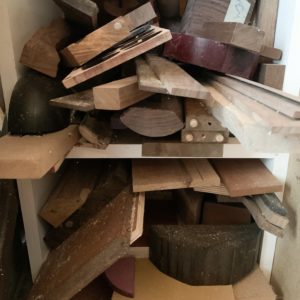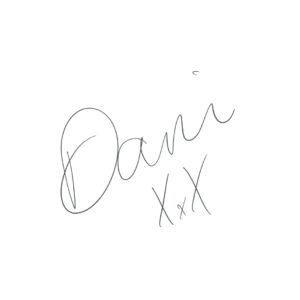The last blog I wrote was ‘What is sustainability?’ which leads neatly onto this one, ‘Gathering sustainable materials’.
What Are Sustainable Materials
Sustainable materials are produced and sourced without disrupting and depleting non-renewable resources. Finding materials that can be replenished, that aren’t harmful to the balance of the environment is crucial to the sustainability cycle. This means that businesses that use raw and sustainable materials need to be creative and innovative to stay ahead of this ever changing cycle, but also in their use of these precious materials.
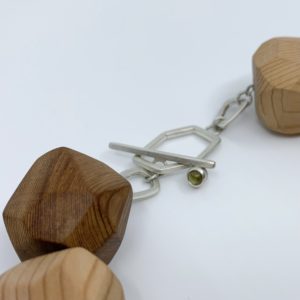
How This Affects Vannucchi
It’s important that these elements of a business are visible and easily accessible for the customer. This is because it’s how the business functions. It’s important that customers are aware of these factors that intimately contribute to the products and services they receive.
I’m always happy when someone asks me about the materials I use and how I source them, because I believe this should be a question everyone wants to know about their potential purchases. I’m really passionate about this and I love connecting with like minded people. This open dialogue enables me to expand on what I do and improve how I do it. I’ve spent a lot of time researching and learning about processes and materials and implementing changes that I believe improves what I do. It’s really important that as my business develops, these changes do not negatively impact quality. Therefore I have to be responsive to customer feedback and implement the right changes, such as choosing carefully what companies I support with my purchases.
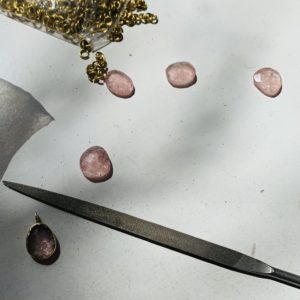 Sourcing Raw Materials
Sourcing Raw Materials
All the materials I use sadly have differing complications, such as mining for metal and gems and logging for wood. These have had to become governed with strict policies and laws. It is important for me to understand why these are in place and then adapt my behaviours and processes in accordance to them.
I want to work alongside others who are equally invested in the future and who are accredited. In particular looking for suppliers that also are responsible in their own supply chain. Working with companies that only fair mine or are FSC certified is a good way of establishing who takes this seriously.
There are also other approaches to sourcing these precious materials which is fast becoming an accepted and popular approach for makers. This I will elaborate on later in this piece.
Gems and Metals
Previously I purchased my materials from all over the world, prioritising the best monetary deal. I did this without considering the origins and what the low cost/value impact had on the chain. I have since learnt that sometimes to ensure a better supply chain, you have to pay a little more. This is largely due to providing better working conditions, lowering environmental impacts and fairer wages for employees.
I wanted to support British businesses that were reliable and responsible in their sourcing of materials. It became important to me to find companies that fair mined their metals and gems. This ranged from small independent businesses to larger national ones, such as Cookson gold and Kernowcraft.
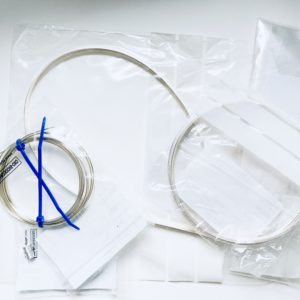
Fair Mining
Companies that fair mine show a conscience for the immediate impact they have on the environment. Alongside this they place an importance on fair working conditions and pay for their workers.
This relates to the mining of gold, other precious metals and gemstones.
Recycling
Cookson Gold is a national provider for jewellery supplies that now sells recycled silver and gold as an eco-friendly alternative. This is made from 100% recycled silver and gold products. Eco silver and Eco gold can be worked in the same way with the same great quality results. This is an increasingly popular product for makers and end consumers who are becoming more eco-aware.
Another approach for sourcing metal and gems has been to remove the need for purchasing new metals and materials entirely. This is done by recycling old and unwanted items that are already in existence. This can involve metals being melted down and reformed, stones reset in more contemporary styles, chains cleaned and rehung, beads restrung and repurposed. This has become a popular way to encourage a more cyclical lifespan for our belongings and to remove the demand for further mining.
Wood
I only purchase wood from FSC (Forest Stewardship Council) certified vendors. This is because they have to hold an up-to-date certificate that certifies their due diligence in their sourcing of this precious material. However I predominantly use off cuts from other local makers turning their scrap into another person’s treasure. This not only helps reduce their waste, but helps to save on the further requirement of wood.
Over the years I have been gifted exotic hardwoods which are in limited supply. For this reason I use them for unique and limited run productions. I waste as little as possible ensuring I can make the most of them. I don’t agree with mass deforestation of woods, so work to limit our part in the supply and demand chain.
Final Thoughts
Sourcing raw materials will always have an impact on the environment. However, we can reduce some of this by replenishing what we can. We want to avoid complete depletion of these resource systems and govern more stringently how these materials are sourced and used. Capping our demand if necessary and replacing them with suitable alternatives.
I highlighted in my previous blog that it’s about the entire chain from supply through manufacture, to retail and end consumer to make sustainability work. It’s also important to be open to adapting our processes, uses and wants for these things. We just need to keep having those conversations and learn as we go.
I hope you’ve enjoyed reading and found that this has been informative as well as answered any questions you may have about how a jewellery business might sustainably gather its materials.
Links
*If you want to read up more on some of the points raised, here are some useful links for you.
https://www.cooksongold.com/fairtrade
https://www.cooksongold.com/Ecosilver/
https://www.cooksongold.com/home/static.jsp?page=modern-slavery-statement
TUESDAY 1ST FEBRUARY 2022
